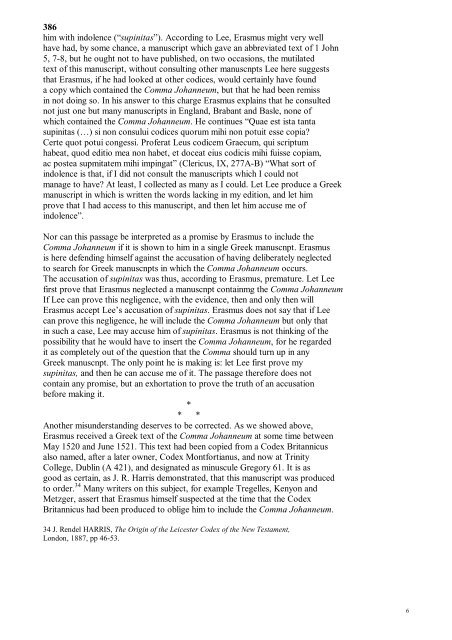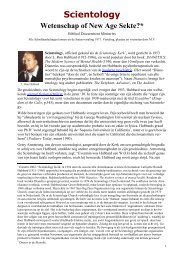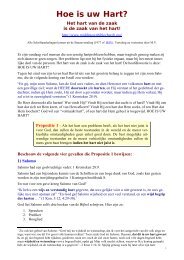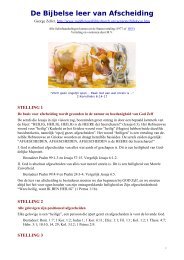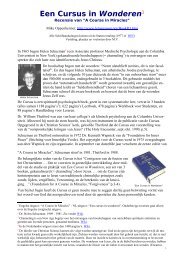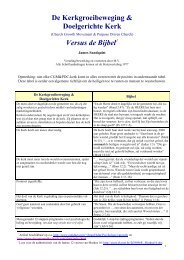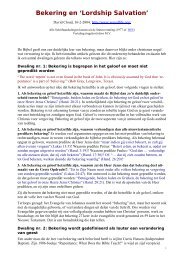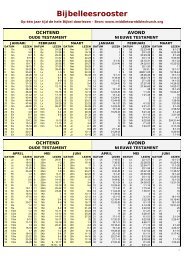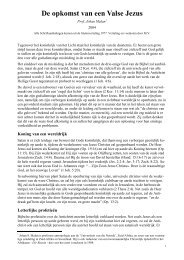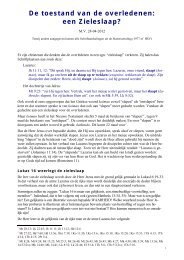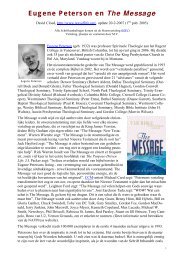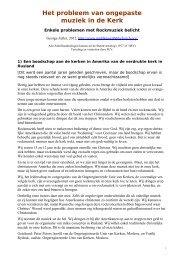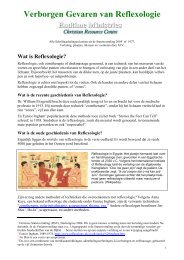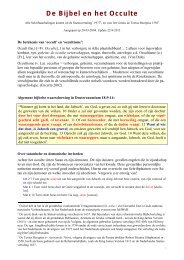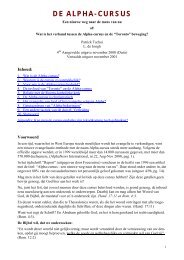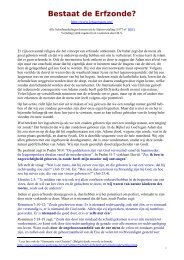erasmus and the comma johanneum - Marc Verhoeven
erasmus and the comma johanneum - Marc Verhoeven
erasmus and the comma johanneum - Marc Verhoeven
Create successful ePaper yourself
Turn your PDF publications into a flip-book with our unique Google optimized e-Paper software.
386<br />
him with indolence (“supinitas”). According to Lee, Erasmus might very well<br />
have had, by some chance, a manuscript which gave an abbreviated text of 1 John<br />
5, 7-8, but he ought not to have published, on two occasions, <strong>the</strong> mutilated<br />
text of this manuscript, without consulting o<strong>the</strong>r manuscnpts Lee here suggests<br />
that Erasmus, if he had looked at o<strong>the</strong>r codices, would certainly have found<br />
a copy which contained <strong>the</strong> Comma Johanneum, but that he had been remiss<br />
in not doing so. In his answer to this charge Erasmus explains that he consulted<br />
not just one but many manuscripts in Engl<strong>and</strong>, Brabant <strong>and</strong> Basle, none of<br />
which contained <strong>the</strong> Comma Johanneum. He continues “Quae est ista tanta<br />
supinitas (…) si non consului codices quorum mihi non potuit esse copia?<br />
Certe quot potui congessi. Proferat Leus codicem Graecum, qui scriptum<br />
habeat, quod editio mea non habet, et doceat eius codicis mihi fuisse copiam,<br />
ac postea supmitatem mihi impingat” (Clericus, IX, 277A-B) “What sort of<br />
indolence is that, if I did not consult <strong>the</strong> manuscripts which I could not<br />
manage to have? At least, I collected as many as I could. Let Lee produce a Greek<br />
manuscript in which is written <strong>the</strong> words lacking in my edition, <strong>and</strong> let him<br />
prove that I had access to this manuscript, <strong>and</strong> <strong>the</strong>n let him accuse me of<br />
indolence”.<br />
Nor can this passage be interpreted as a promise by Erasmus to include <strong>the</strong><br />
Comma Johanneum if it is shown to him in a single Greek manuscnpt. Erasmus<br />
is here defending himself against <strong>the</strong> accusation of having deliberately neglected<br />
to search for Greek manuscnpts in which <strong>the</strong> Comma Johanneum occurs.<br />
The accusation of supinitas was thus, according to Erasmus, premature. Let Lee<br />
first prove that Erasmus neglected a manuscnpt containmg <strong>the</strong> Comma Johanneum<br />
If Lee can prove this negligence, with <strong>the</strong> evidence, <strong>the</strong>n <strong>and</strong> only <strong>the</strong>n will<br />
Erasmus accept Lee’s accusation of supinitas. Erasmus does not say that if Lee<br />
can prove this negligence, he will include <strong>the</strong> Comma Johanneum but only that<br />
in such a case, Lee may accuse him of supinitas. Erasmus is not thinking of <strong>the</strong><br />
possibility that he would have to insert <strong>the</strong> Comma Johanneum, for he regarded<br />
it as completely out of <strong>the</strong> question that <strong>the</strong> Comma should turn up in any<br />
Greek manuscnpt. The only point he is making is: let Lee first prove my<br />
supinitas, <strong>and</strong> <strong>the</strong>n he can accuse me of it. The passage <strong>the</strong>refore does not<br />
contain any promise, but an exhortation to prove <strong>the</strong> truth of an accusation<br />
before making it.<br />
***<br />
*****<br />
Ano<strong>the</strong>r misunderst<strong>and</strong>ing deserves to be corrected. As we showed above,<br />
Erasmus received a Greek text of <strong>the</strong> Comma Johanneum at some time between<br />
May 1520 <strong>and</strong> June 1521. This text had been copied from a Codex Britannicus<br />
also named, after a later owner, Codex Montfortianus, <strong>and</strong> now at Trinity<br />
College, Dublin (A 421), <strong>and</strong> designated as minuscule Gregory 61. It is as<br />
good as certain, as J. R. Harris demonstrated, that this manuscript was produced<br />
to order. 34 Many writers on this subject, for example Tregelles, Kenyon <strong>and</strong><br />
Metzger, assert that Erasmus himself suspected at <strong>the</strong> time that <strong>the</strong> Codex<br />
Britannicus had been produced to oblige him to include <strong>the</strong> Comma Johanneum.<br />
34 J. Rendel HARRIS, The Origin of <strong>the</strong> Leicester Codex of <strong>the</strong> New Testament,<br />
London, 1887, pp 46-53.<br />
6


